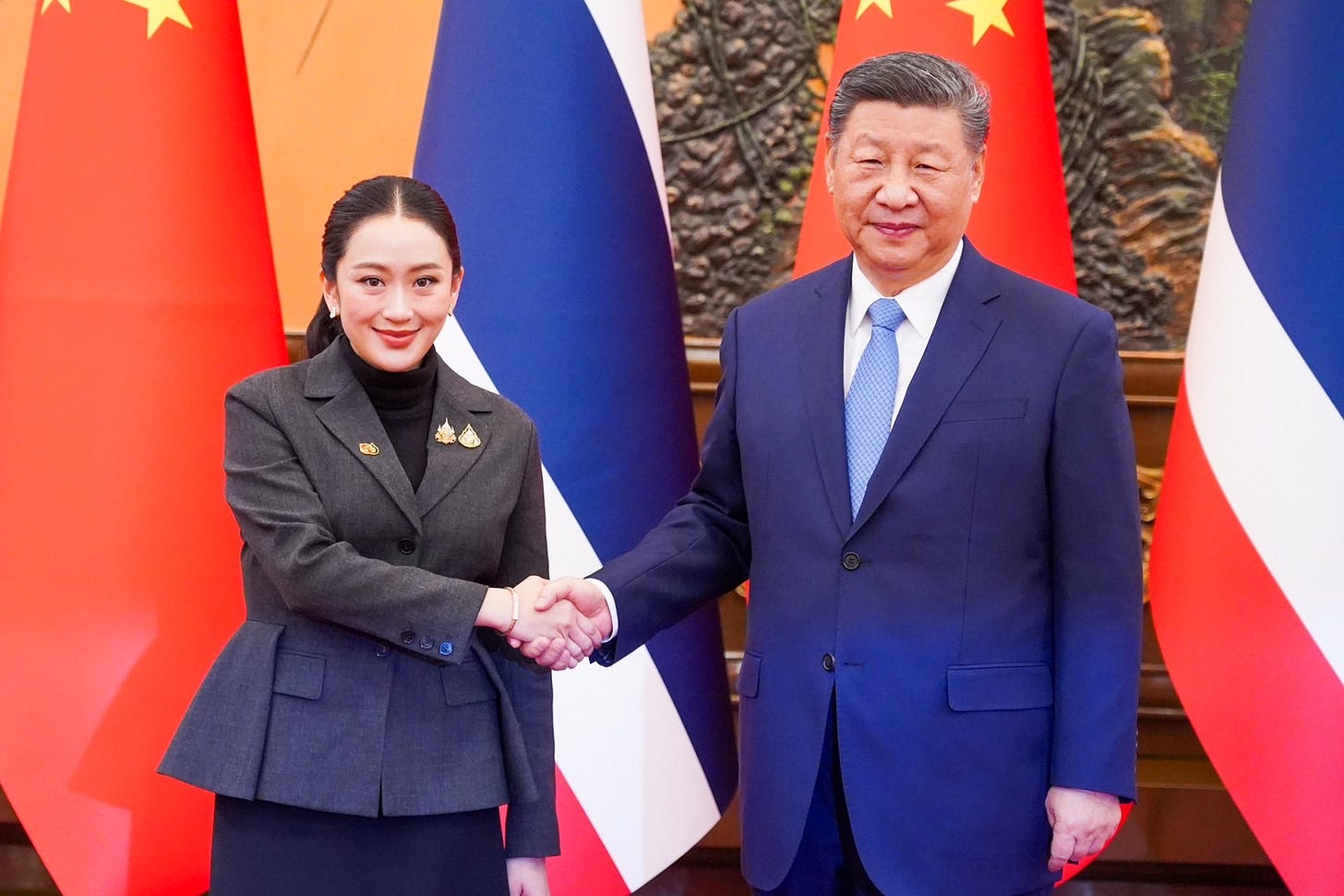Paetongtarn Shinawatra Meets Xi Jinping
The Prime Minister makes her first official visit to China

Perhaps President Xi Jinping of China felt a sense of déjà vu when he met with Prime Minister Paetongtarn Shinawatra of Thailand. Before Paetongtarn, the last time family member of Thaksin Shinawatra’s that Xi had met was then-prime minister Yingluck Shinawatra, who he last met in 2013. Then, he was meeting a political neophyte who had suddenly been catapulted to the role of Thailand’s head of government with very limited political and diplomatic experience, who owed her position to being Thaksin’s sister. A little over a decade on, and history rhymes: Xi found himself shaking hands with Thaksin’s daughter.
Although this was not her first meeting with Xi — they had met on the sidelines of the APEC summit back in November — there were inevitable concerns about whether the inexperienced prime minister was ready for one of her biggest moments on the world stage so far1. On the surface, Paetongtarn’s visit went swimmingly. Coinciding with the 50th anniversary of Sino-Thai diplomatic relations, the two leaders had warm words for each other. Xi in particular noted how the two countries have been friends for “thousands of years,”2 and made the obligatory remark that "China and Thailand are one family.”
Look deeper, however, and we can make out some of the current tensions in the relationship. Immediately preceding Paetongtarn’s trip, China’s Vice Minister of Public Security Liu Zhongyi made a visit to Thailand, where he met with leading officials such as Deputy Prime Minister Phumtham Wetchayachai and made a trip to the Myanmar-Thailand border. My understanding is that such field visits in foreign countries by a top Chinese official are not common. It was clear that Liu had visited to put pressure on Thailand to take stronger action on the proliferating scam centers on the Myanmar border, run by Chinese nationals and preying on Chinese nationals visiting Thailand.
As a response, the Thai government suspended the supply of electricity to several hotspots on the Burmese side of the border — a move of dubious effectiveness in actually stopping the scam centers, but sufficient for China to note in its readout of the Paetongtarn visit that “China appreciates Thailand's effective measures to crack down on online gambling and telecom fraud.” For good measure, Paetongtarn insisted to Chinese media that she “has Chinese blood” and so she can guarantee that Thailand “is going to be very safe for Chinese people.”
Xi also said that China is ready to implement “flagship projects such as the China-Thailand railway.” Of course, Xi and Thailand’s leaders have been discussing these projects since the days of Yingluck. It was a subject in which he has made his ire well known: back in the 2017, he refused to invite then-prime minister Prayut Chan-o-cha to a Belt and Road summit, reportedly because he was frustrated with delays in the Sino-Thai railway project. Last year, China’s Foreign Minister Wang Yi had also urged this project to be sped up while visiting Bangkok. The cabinet has just approved the second phase of this project.3
And a hint was given at the uncertain era the two leaders now find themselves in. The 71-year old Xi, now deep into his third term, is now talking to the fourth Thai prime minister of his tenure. In that time, the world has changed significantly: two Donald Trump victories and a global pandemic are more than enough to make sure of that. “In the face of profound changes unseen in a century,” Xi said, utilizing one of his few favorite phrases, “China and Thailand should consolidate strategic mutual trust, firmly support each other, and respond to uncertainties in the external environment with the stability and certainty of China-Thailand relations.”
But how exactly Paetongtarn should manage this relationship in an era of profound change hasn’t become clearer. The trip coincided with a start of a renewed trade war between the United States and China, as President Donald Trump instituted ten percent tariffs on all Chinese goods. Trump has made clear his ire for BRICS — a grouping that Thailand has recently expressed interest in joining. Move too close to China, and Bangkok risks coming under Trump’s spotlight.
At the same time, the Thai economy has slowed, and has become ever-more reliant on tourism, one-fifth of which is from China: which is why Paetongtarn has been so reconciliatory towards Beijing. Yet China’s economy has also slowed significantly, as insufficient domestic demand has caused an overcapacity issue that is leading to an influx of cheap Chinese goods into countries like Thailand, leading to another issue in the bilateral relationship. One good visit does not, unfortunately, shed greater light on how Paetongtarn will be able to manage the larger strategic issues her government faces.
Which is understandable, given that in a remarkably tone-deaf moment, Paetongtarn had just a few weeks ago recorded an AI-generated video of herself speaking in Chinese to reassure tourists of safety — ignoring somehow the deeply weird feeling of distrust caused by such a smoothly AI-generated clip.
As the Asian history expert Kornkit Disathan has noted, this phrase is interesting because Thai history textbooks place the marker for the start of Thai history at the Sukhothai Kingdom, which was founded around seven centuries ago. But China dates Thai history to kingdoms recorded by the Chinese over two thousand years ago.
If you are interested in the costs and benefits of this railway project, this piece in The Diplomat is worth a read.


Hi Ken, great article as always. But I wonder why your article hasn't mentioned the allegations about Xi Jinping involving pandas in the zoo, and how these might affect diplomatic relations between China and Thailand?